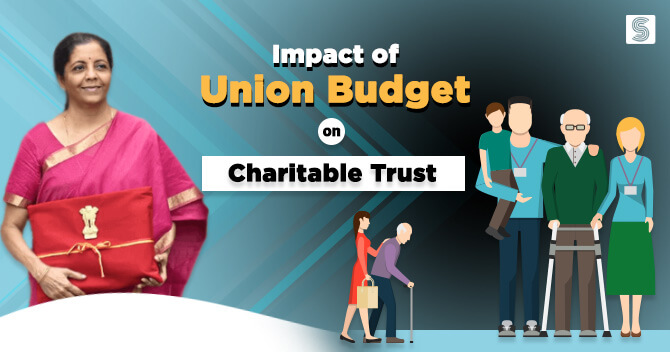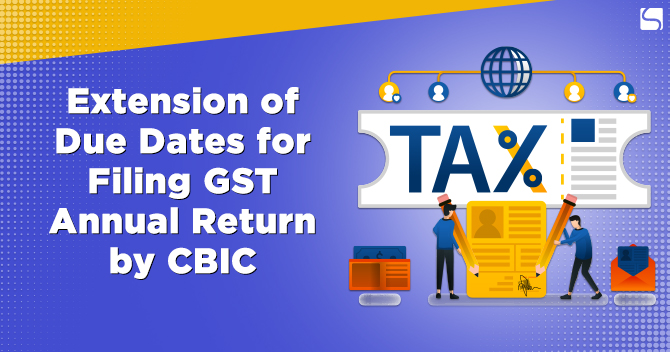Union Budget 2020 introduces significant changes for Charitable Trusts

Dashmeet Kaur | Updated: Mar 06, 2020 | Category: Income Tax, News
Union Budget 2020 has set some new compliance for Charitable Trust, NGO and religious institutions to claim tax exemptions. The revised provision will bring a pivotal change for such organizations. The existing Charitable Trusts and Institutions registered under Section 12A (before 1996), Section 12AA (after 1996), 10(23C) and Section 80G shall be required to re-apply under Income Tax to revalidate their existing Registrations. The proposal of approval and Registration of Trusts & institutions will come into effect from 1st April 2020. This write-up will give exclusive information about the proposed regime and its impact on Charitable Trusts and other institutions.
Table of Contents
Changes in the Registration & approval of Charitable Trust and Institutions
Let’s analyze the proposed modifications in the present regime:
Present Regime
- Currently, Section 12AA and Section 12A prescribes the procedure to register for tax exemption for Trusts Registered before 1996. However, now it is proposed to be governed by new Section 12AB.
- The present regime states that Registration granted under Section 12AA shall be valid unless the Authority cancels it.
- Moreover, the Charitable Trusts are eligible for approval under Section 80G that enables its donors to avail tax exemptions on each donation. Such approval is valid unless cancelled by the Authority.
- Educational Institution, Universities, Medical Institutions and Hospitals can claim tax exemption under Section 10(23C) after the approval of the Authority. Once the new compliance comes into force, the approval under Section 10(23C) shall be operative unless and otherwise cancelled by the Authority.
Proposed Regime
- The existing Registered Charitable Trusts and institutions have to re-apply for Registration under the new provisions of Section 12AB on or before 31st August 2020.
- Presently, Registration is granted for a long period until and unless Tax Authority revokes it whereas, the new Registration will be granted only for a limited duration of five years. Now, Registration will be granted for a limited period of 5 years.
- As per Section 10(23C) or 11, all Trusts or institutions will have to renew Registration and approval after every five years to claim an exemption.
- When any Trust or institution modifies its objects, but the modifications do not conform to the terms of Registration. In this case, the Application must be made to the designated Authority within 30 days from the date of such change.
New Charitable Trusts can loop onto Provisional Registration
The Union Budget 2020 has also proposed a new concept of Provisional Registration for the Trusts that have not already registered with the Income Tax Authorities or commenced any operations. Here are the provisions for the concept of Provisional Registration:
- Provisional Registration shall be valid for three years from the Assessment Year from which the Registration is needed.
- It is proposed that the new Trusts and other institutions must apply to Principal Commissioner of Income Tax one month prior to the commencement of the previous year in which the Registration is required.
- Provisionally Registered Charitable Trusts and other institutions must file an Application for 5 years. Registration must be either within 6 months of commencement or at least 6 months before the expiry of 3 years.
- It is perceived that Provisional Registration will be granted with minimum documents and lesser enquiry about the objects of a Trust.
- In a nutshell, the new Charitable Trust or other institutions applying for the first time will not be granted full and final Registration, but they can avail only Provisional approval or Registration. Such Trusts may be granted Registration after proper verification of its activities.
Simultaneous Registration under Section 12AB and 10(23C) is not permitted
Section 11 of Income Tax Act, 1961 mandates that Charitable Trusts and institutions can either claim an exemption under Section 10(23C) or under Section 11 and 12 of Income Tax Act, 1961. Thus, the Trusts and institutions are compelled to choose only one of the prescribed exemptions.
Nonetheless, there are numerous Schools, Colleges and Hospital, which are leveraging the benefits of dual Registration under Section 10(23C) and Section 12AA. If an exemption is denied under Section 10(23C) to a Trust, then it can take the benefit of alternate exemption of Section 12AA.
With the effect of Union Budget 2020 [1] , all the Charitable Trusts and other institutions that are currently registered under Section 10(23C) and Section12AA have to choose a single Section. Dual Registration under both is not permissible.
Additional Provisions for Trusts registered under Section 80G
All the Charitable Trusts or institutions registered under 80G needs to submit a statement of donations received in the prescribed manner. The donors can only avail the benefits of 80G if the Charitable Trusts or institutes furnish the corresponding statement. Such institutes are subject to fine due to non-submission of the statement.
Moreover, the donors (individuals/Companies) who opts for a reduced rate of tax will not get deduction benefits under Section 80G .
Union Budget has extended the due date of filing ITR
The new provisions have extended the due date for filing of Income Tax Return for Charitable Trusts and other institutions from 30th September to 31st October.
The Government of India also proposes to develop a National Register of all Religious Institutions and Charitable Trusts. Further, Income Tax Department shall issue a Unique Identification Number (UIN) to all charitable and religious institutions.
Time schedule under the Proposed Regime:
Following is the checklist of schedules that the Charitable Trusts must consider:
- The existing registered Charitable Trusts needs to re-apply for registration or approval on or before 31.08.2020.
- New charitable Trusts that are applying for Provisional Registration have to file an Application at least 1 month before the commencement of operations.
- For Trust that has been registered provisionally under the new regime has to make an Application within 6 months of business commencement or at least 6 months before the expiry of 3 years period (whichever is earlier).
- Trusts with Registration for 5 years must apply a new Application at least 6 months before the expiry of 5 years Registration period.
- Where the Trust has undertaken modifications or changed the objects clause, then the Trust must file an application within 30 days from the date of the said modification.
Conclusion
Also, Read:Input Tax Credit under GST















